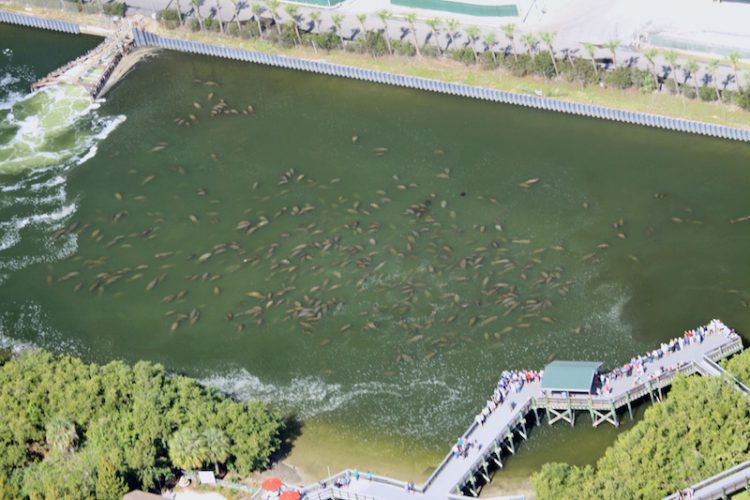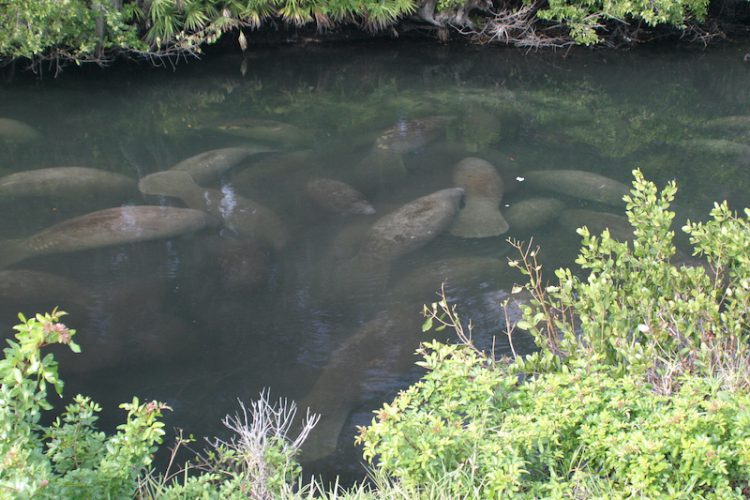Full Title: Creating Secure Warm-Water Habitat Networks for Manatees along Florida’s Gulf Coast: Developing a Vision, Identifying Gaps, and Prioritizing Restoration Sites
This project will prioritize efforts to restore, enhance, and create warm-water habitats in order to provide a network of thermal shelters for manatees along Florida’s Gulf Coast.
Lead Investigator: Charles Deutsch, Florida Fish & Wildlife Conservation Commission, chip.deutsch@myfwc.com
Natural Resource Manager: Maria Merrill, Florida Fish & Wildlife Conservation Commission
Project Team: Margie Barlas, Chelsey Crandall, Holly Edwards, Timothy Gowan, Andrea Krzystan, and Leslie Ward-Geiger (Florida Fish & Wildlife Conservation Commission, Fish & Wildlife Research Institute); Ron Mezich and Michelle Pasawicz (Florida Fish & Wildlife Conservation Commission); Terri Calleson (U.S. Fish & Wildlife Service); and Julien Martin (U.S. Geological Survey)
Federal Program Officer/Point of Contact: Frank Parker (frank.parker@noaa.gov)
Award Amount: $124,996
Award Period: This project began in September 2021 and will end in August 2023.
Why it matters: As power plants are retired and spring flows decline along Florida’s Gulf Coast, less warm-water habitat will be available for manatees to help regulate their body temperatures during cold, winter months. Managers are working to ensure that reliable networks of thermal refuges will be present for manatees over the long term, but a range of uncertainties needs to be addressed to better inform their decision-making. This project will prioritize efforts to restore, enhance, and create warm-water habitats in order to provide a network of thermal shelters for manatees along Florida’s Gulf Coast.
What the team is doing: Researchers and managers will work together to prioritize the list of uncertainties underlying steps in the decision process; to inventory and evaluate existing manatee, human dimensions, and environmental data relevant to the issue; and to identify key information gaps. The project will develop a detailed research plan to identify the locations and describe the habitat quality of known and potential warm-water sites, to define the optimal values of a thermal habitat network for comparison to existing networks, to project environmental changes that could affect future networks, and to model the effects of alternative winter range scenarios on manatee populations. Stakeholders, including boating groups, environmental NGOs, and electric utilities, will be asked to share input on research and management objectives, local knowledge, and their perspectives and concerns.
Expected outcome: By August 2022, the team will have summarized existing datasets on existing warm-water habitats as well as environmental and human dimensions aspects that may affect a future thermal network for manatees along Florida’s Gulf Coast. In addition to a final report that will provide a detailed blueprint of prioritized research studies, another report will address how those findings will be transferred to and applied by managers in the multi-level decision process. A workshop of managers, researchers, and stakeholders will discuss the state of the science and share perspectives on how best to apply research findings to management decisions regarding warm-water habitat for manatees.
Other Resources
Coming soon
Coming soon
Coming soon
Coming Soon
Coming Soon
 Official websites use.gov
A .gov website belongs to an official government organization in the United States.
Official websites use.gov
A .gov website belongs to an official government organization in the United States.
 Secure .gov websites use HTTPS
A lock or https:// means you’ve safely connected to the .gov website. Share sensitive information only on official, secure websites.
Secure .gov websites use HTTPS
A lock or https:// means you’ve safely connected to the .gov website. Share sensitive information only on official, secure websites.

